Cross-Cultural Leadership: Nigeria and Denmark Comparison
VerifiedAdded on 2021/01/01
|18
|3813
|146
Report
AI Summary
This report provides a comprehensive analysis of cross-cultural leadership, focusing on Nigeria and Denmark. It begins by analyzing the diverse cultures of Nigeria, including the Efik-Ibibio, Bini, and Yoruba cultures, and discusses the application of transactional and servant leadership theories in the Nigerian context. The report then delves into the challenges faced by leaders in Denmark in maintaining business excellence and ongoing quality improvement, referencing the World Economic Report and Global Report of Denmark. It highlights issues such as lack of inspiration, over-control, developing managerial effectiveness, managing internal stakeholders, and tax reforms. Finally, the report compares and contrasts the human capital development statistics of Nigeria and Denmark, examining their rankings in the Global Human Capital Index and discussing the factors influencing their respective levels of development. The report concludes by synthesizing the key findings and offering insights into effective cross-cultural leadership strategies.
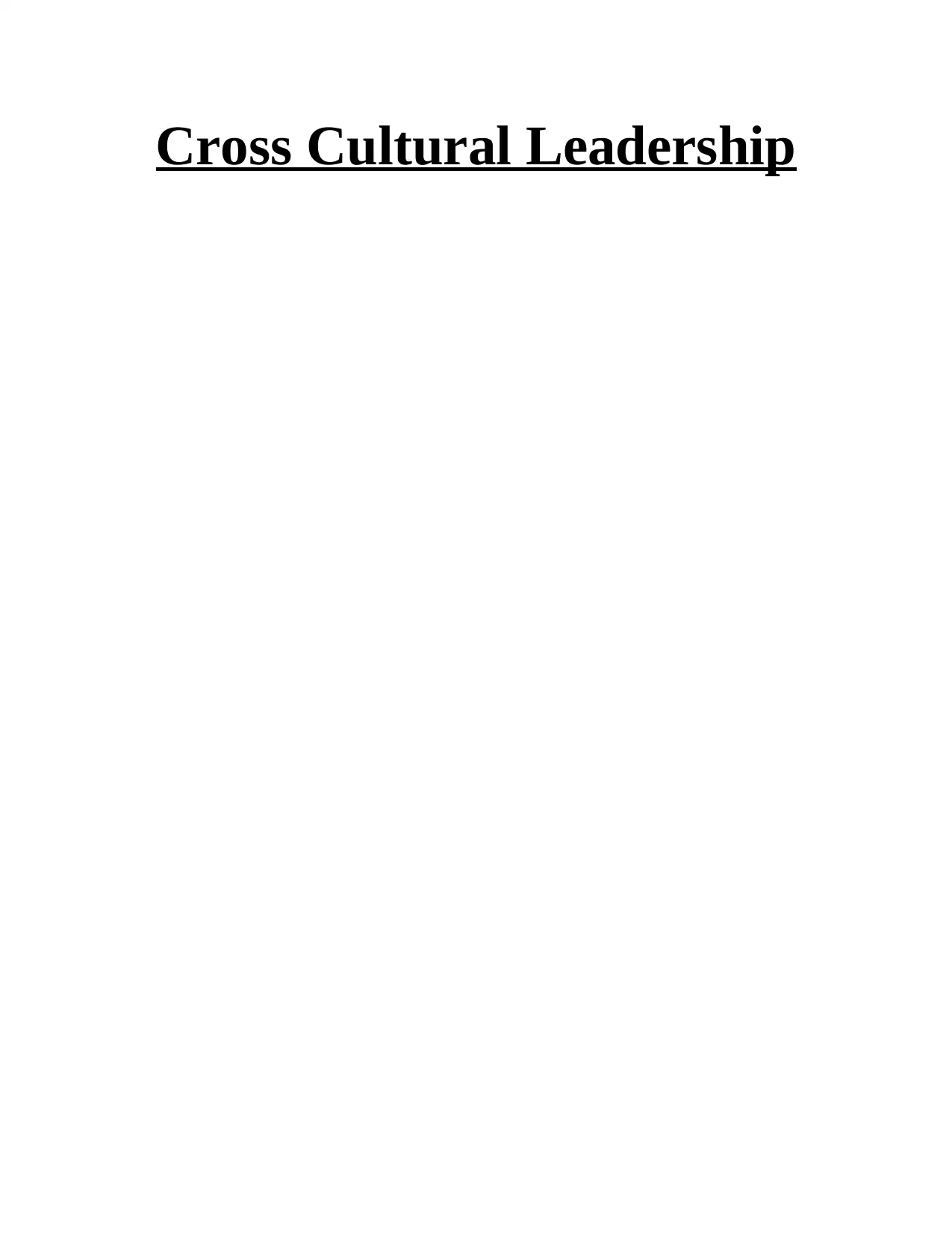
Cross Cultural Leadership
Paraphrase This Document
Need a fresh take? Get an instant paraphrase of this document with our AI Paraphraser
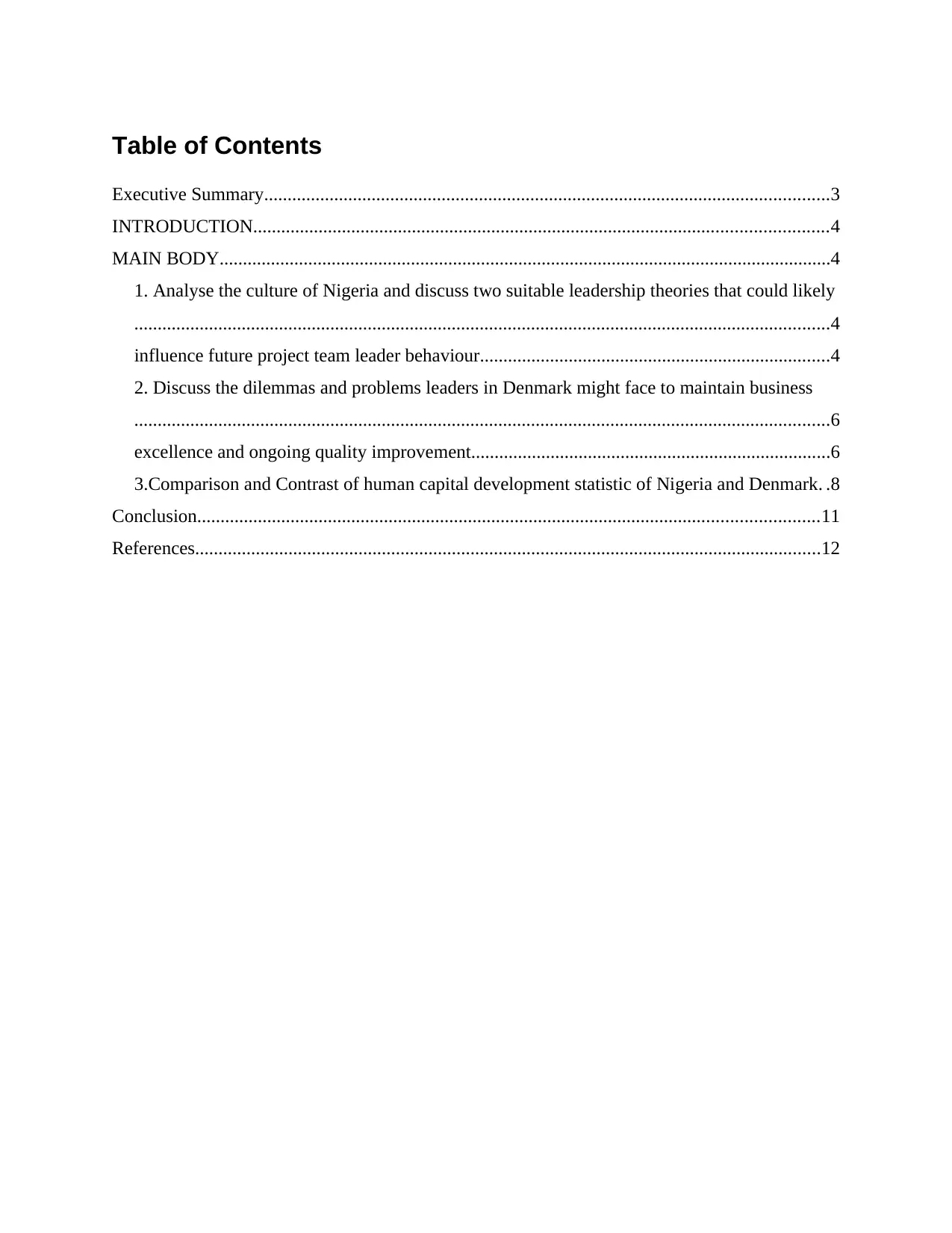
Table of Contents
Executive Summary.........................................................................................................................3
INTRODUCTION...........................................................................................................................4
MAIN BODY...................................................................................................................................4
1. Analyse the culture of Nigeria and discuss two suitable leadership theories that could likely
.....................................................................................................................................................4
influence future project team leader behaviour...........................................................................4
2. Discuss the dilemmas and problems leaders in Denmark might face to maintain business
.....................................................................................................................................................6
excellence and ongoing quality improvement.............................................................................6
3.Comparison and Contrast of human capital development statistic of Nigeria and Denmark. .8
Conclusion.....................................................................................................................................11
References......................................................................................................................................12
Executive Summary.........................................................................................................................3
INTRODUCTION...........................................................................................................................4
MAIN BODY...................................................................................................................................4
1. Analyse the culture of Nigeria and discuss two suitable leadership theories that could likely
.....................................................................................................................................................4
influence future project team leader behaviour...........................................................................4
2. Discuss the dilemmas and problems leaders in Denmark might face to maintain business
.....................................................................................................................................................6
excellence and ongoing quality improvement.............................................................................6
3.Comparison and Contrast of human capital development statistic of Nigeria and Denmark. .8
Conclusion.....................................................................................................................................11
References......................................................................................................................................12
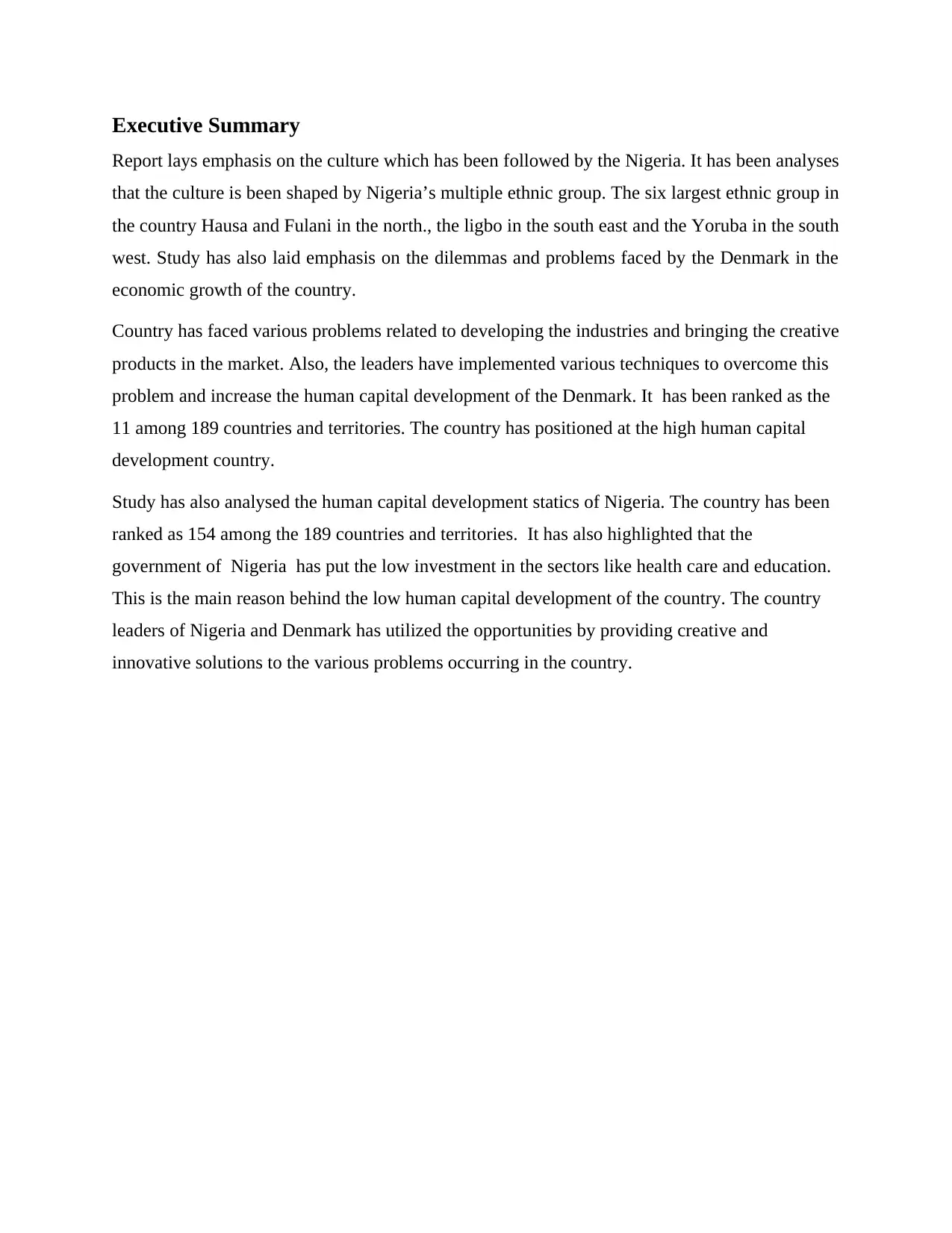
Executive Summary
Report lays emphasis on the culture which has been followed by the Nigeria. It has been analyses
that the culture is been shaped by Nigeria’s multiple ethnic group. The six largest ethnic group in
the country Hausa and Fulani in the north., the ligbo in the south east and the Yoruba in the south
west. Study has also laid emphasis on the dilemmas and problems faced by the Denmark in the
economic growth of the country.
Country has faced various problems related to developing the industries and bringing the creative
products in the market. Also, the leaders have implemented various techniques to overcome this
problem and increase the human capital development of the Denmark. It has been ranked as the
11 among 189 countries and territories. The country has positioned at the high human capital
development country.
Study has also analysed the human capital development statics of Nigeria. The country has been
ranked as 154 among the 189 countries and territories. It has also highlighted that the
government of Nigeria has put the low investment in the sectors like health care and education.
This is the main reason behind the low human capital development of the country. The country
leaders of Nigeria and Denmark has utilized the opportunities by providing creative and
innovative solutions to the various problems occurring in the country.
Report lays emphasis on the culture which has been followed by the Nigeria. It has been analyses
that the culture is been shaped by Nigeria’s multiple ethnic group. The six largest ethnic group in
the country Hausa and Fulani in the north., the ligbo in the south east and the Yoruba in the south
west. Study has also laid emphasis on the dilemmas and problems faced by the Denmark in the
economic growth of the country.
Country has faced various problems related to developing the industries and bringing the creative
products in the market. Also, the leaders have implemented various techniques to overcome this
problem and increase the human capital development of the Denmark. It has been ranked as the
11 among 189 countries and territories. The country has positioned at the high human capital
development country.
Study has also analysed the human capital development statics of Nigeria. The country has been
ranked as 154 among the 189 countries and territories. It has also highlighted that the
government of Nigeria has put the low investment in the sectors like health care and education.
This is the main reason behind the low human capital development of the country. The country
leaders of Nigeria and Denmark has utilized the opportunities by providing creative and
innovative solutions to the various problems occurring in the country.
⊘ This is a preview!⊘
Do you want full access?
Subscribe today to unlock all pages.

Trusted by 1+ million students worldwide
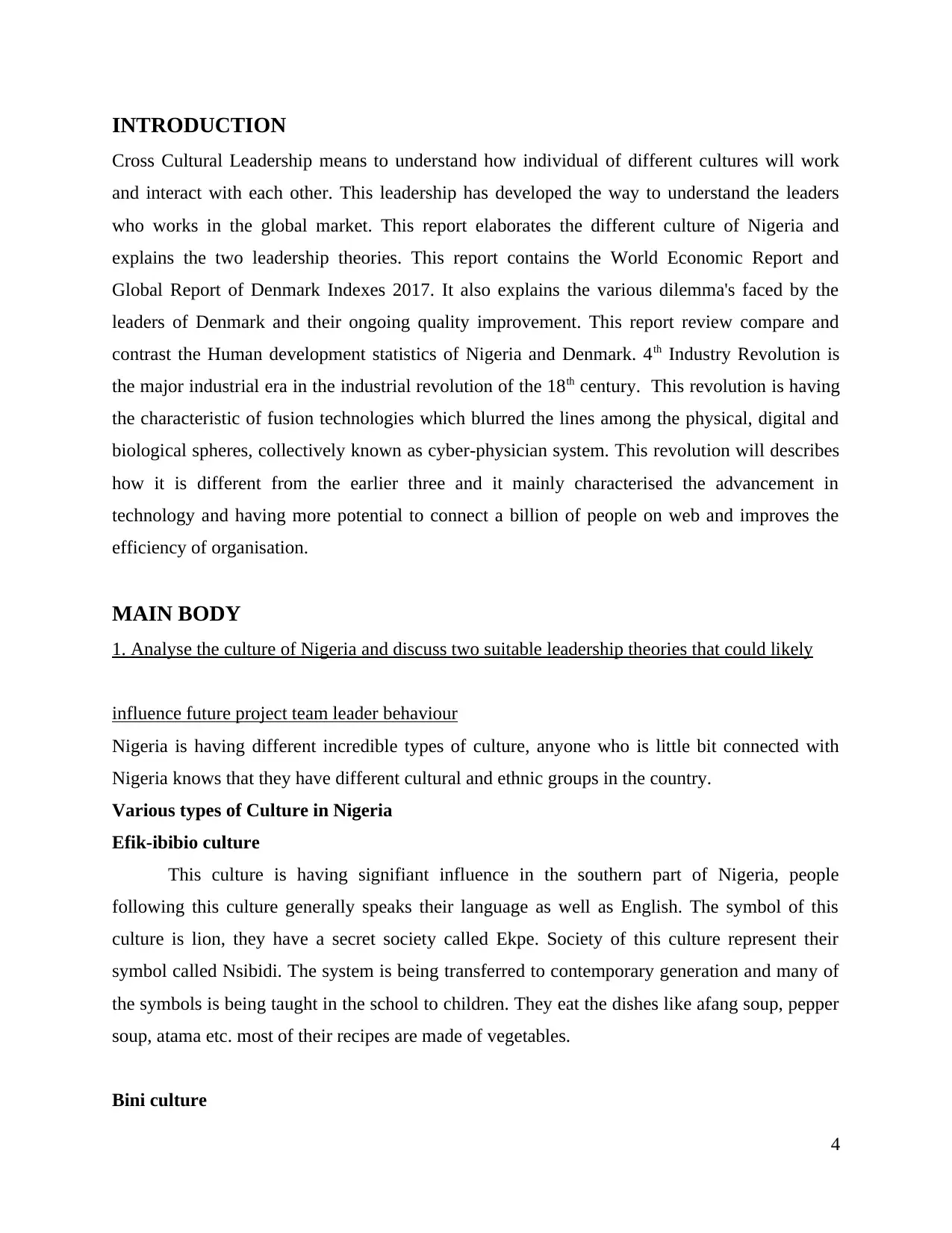
INTRODUCTION
Cross Cultural Leadership means to understand how individual of different cultures will work
and interact with each other. This leadership has developed the way to understand the leaders
who works in the global market. This report elaborates the different culture of Nigeria and
explains the two leadership theories. This report contains the World Economic Report and
Global Report of Denmark Indexes 2017. It also explains the various dilemma's faced by the
leaders of Denmark and their ongoing quality improvement. This report review compare and
contrast the Human development statistics of Nigeria and Denmark. 4th Industry Revolution is
the major industrial era in the industrial revolution of the 18th century. This revolution is having
the characteristic of fusion technologies which blurred the lines among the physical, digital and
biological spheres, collectively known as cyber-physician system. This revolution will describes
how it is different from the earlier three and it mainly characterised the advancement in
technology and having more potential to connect a billion of people on web and improves the
efficiency of organisation.
MAIN BODY
1. Analyse the culture of Nigeria and discuss two suitable leadership theories that could likely
influence future project team leader behaviour
Nigeria is having different incredible types of culture, anyone who is little bit connected with
Nigeria knows that they have different cultural and ethnic groups in the country.
Various types of Culture in Nigeria
Efik-ibibio culture
This culture is having signifiant influence in the southern part of Nigeria, people
following this culture generally speaks their language as well as English. The symbol of this
culture is lion, they have a secret society called Ekpe. Society of this culture represent their
symbol called Nsibidi. The system is being transferred to contemporary generation and many of
the symbols is being taught in the school to children. They eat the dishes like afang soup, pepper
soup, atama etc. most of their recipes are made of vegetables.
Bini culture
4
Cross Cultural Leadership means to understand how individual of different cultures will work
and interact with each other. This leadership has developed the way to understand the leaders
who works in the global market. This report elaborates the different culture of Nigeria and
explains the two leadership theories. This report contains the World Economic Report and
Global Report of Denmark Indexes 2017. It also explains the various dilemma's faced by the
leaders of Denmark and their ongoing quality improvement. This report review compare and
contrast the Human development statistics of Nigeria and Denmark. 4th Industry Revolution is
the major industrial era in the industrial revolution of the 18th century. This revolution is having
the characteristic of fusion technologies which blurred the lines among the physical, digital and
biological spheres, collectively known as cyber-physician system. This revolution will describes
how it is different from the earlier three and it mainly characterised the advancement in
technology and having more potential to connect a billion of people on web and improves the
efficiency of organisation.
MAIN BODY
1. Analyse the culture of Nigeria and discuss two suitable leadership theories that could likely
influence future project team leader behaviour
Nigeria is having different incredible types of culture, anyone who is little bit connected with
Nigeria knows that they have different cultural and ethnic groups in the country.
Various types of Culture in Nigeria
Efik-ibibio culture
This culture is having signifiant influence in the southern part of Nigeria, people
following this culture generally speaks their language as well as English. The symbol of this
culture is lion, they have a secret society called Ekpe. Society of this culture represent their
symbol called Nsibidi. The system is being transferred to contemporary generation and many of
the symbols is being taught in the school to children. They eat the dishes like afang soup, pepper
soup, atama etc. most of their recipes are made of vegetables.
Bini culture
4
Paraphrase This Document
Need a fresh take? Get an instant paraphrase of this document with our AI Paraphraser
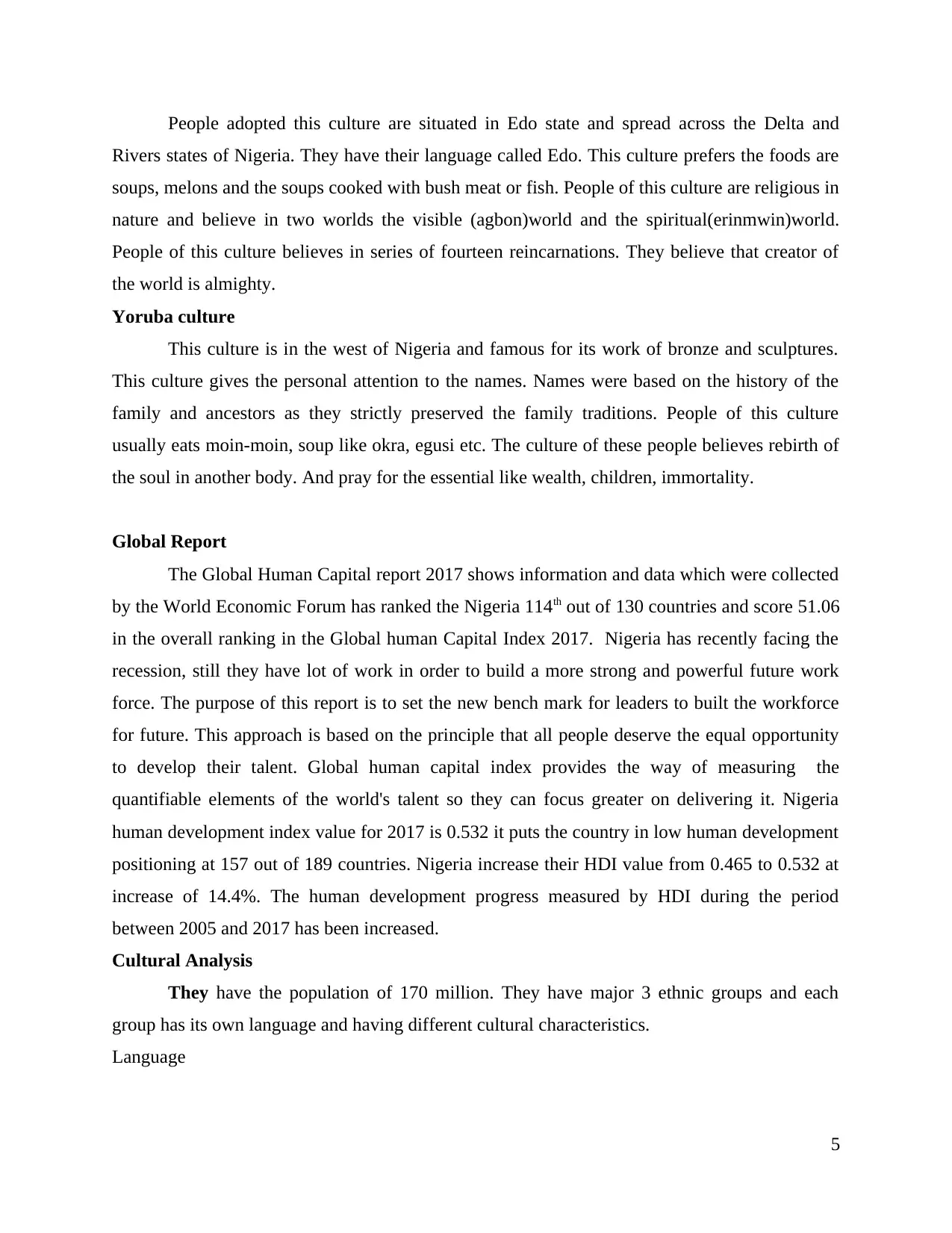
People adopted this culture are situated in Edo state and spread across the Delta and
Rivers states of Nigeria. They have their language called Edo. This culture prefers the foods are
soups, melons and the soups cooked with bush meat or fish. People of this culture are religious in
nature and believe in two worlds the visible (agbon)world and the spiritual(erinmwin)world.
People of this culture believes in series of fourteen reincarnations. They believe that creator of
the world is almighty.
Yoruba culture
This culture is in the west of Nigeria and famous for its work of bronze and sculptures.
This culture gives the personal attention to the names. Names were based on the history of the
family and ancestors as they strictly preserved the family traditions. People of this culture
usually eats moin-moin, soup like okra, egusi etc. The culture of these people believes rebirth of
the soul in another body. And pray for the essential like wealth, children, immortality.
Global Report
The Global Human Capital report 2017 shows information and data which were collected
by the World Economic Forum has ranked the Nigeria 114th out of 130 countries and score 51.06
in the overall ranking in the Global human Capital Index 2017. Nigeria has recently facing the
recession, still they have lot of work in order to build a more strong and powerful future work
force. The purpose of this report is to set the new bench mark for leaders to built the workforce
for future. This approach is based on the principle that all people deserve the equal opportunity
to develop their talent. Global human capital index provides the way of measuring the
quantifiable elements of the world's talent so they can focus greater on delivering it. Nigeria
human development index value for 2017 is 0.532 it puts the country in low human development
positioning at 157 out of 189 countries. Nigeria increase their HDI value from 0.465 to 0.532 at
increase of 14.4%. The human development progress measured by HDI during the period
between 2005 and 2017 has been increased.
Cultural Analysis
They have the population of 170 million. They have major 3 ethnic groups and each
group has its own language and having different cultural characteristics.
Language
5
Rivers states of Nigeria. They have their language called Edo. This culture prefers the foods are
soups, melons and the soups cooked with bush meat or fish. People of this culture are religious in
nature and believe in two worlds the visible (agbon)world and the spiritual(erinmwin)world.
People of this culture believes in series of fourteen reincarnations. They believe that creator of
the world is almighty.
Yoruba culture
This culture is in the west of Nigeria and famous for its work of bronze and sculptures.
This culture gives the personal attention to the names. Names were based on the history of the
family and ancestors as they strictly preserved the family traditions. People of this culture
usually eats moin-moin, soup like okra, egusi etc. The culture of these people believes rebirth of
the soul in another body. And pray for the essential like wealth, children, immortality.
Global Report
The Global Human Capital report 2017 shows information and data which were collected
by the World Economic Forum has ranked the Nigeria 114th out of 130 countries and score 51.06
in the overall ranking in the Global human Capital Index 2017. Nigeria has recently facing the
recession, still they have lot of work in order to build a more strong and powerful future work
force. The purpose of this report is to set the new bench mark for leaders to built the workforce
for future. This approach is based on the principle that all people deserve the equal opportunity
to develop their talent. Global human capital index provides the way of measuring the
quantifiable elements of the world's talent so they can focus greater on delivering it. Nigeria
human development index value for 2017 is 0.532 it puts the country in low human development
positioning at 157 out of 189 countries. Nigeria increase their HDI value from 0.465 to 0.532 at
increase of 14.4%. The human development progress measured by HDI during the period
between 2005 and 2017 has been increased.
Cultural Analysis
They have the population of 170 million. They have major 3 ethnic groups and each
group has its own language and having different cultural characteristics.
Language
5
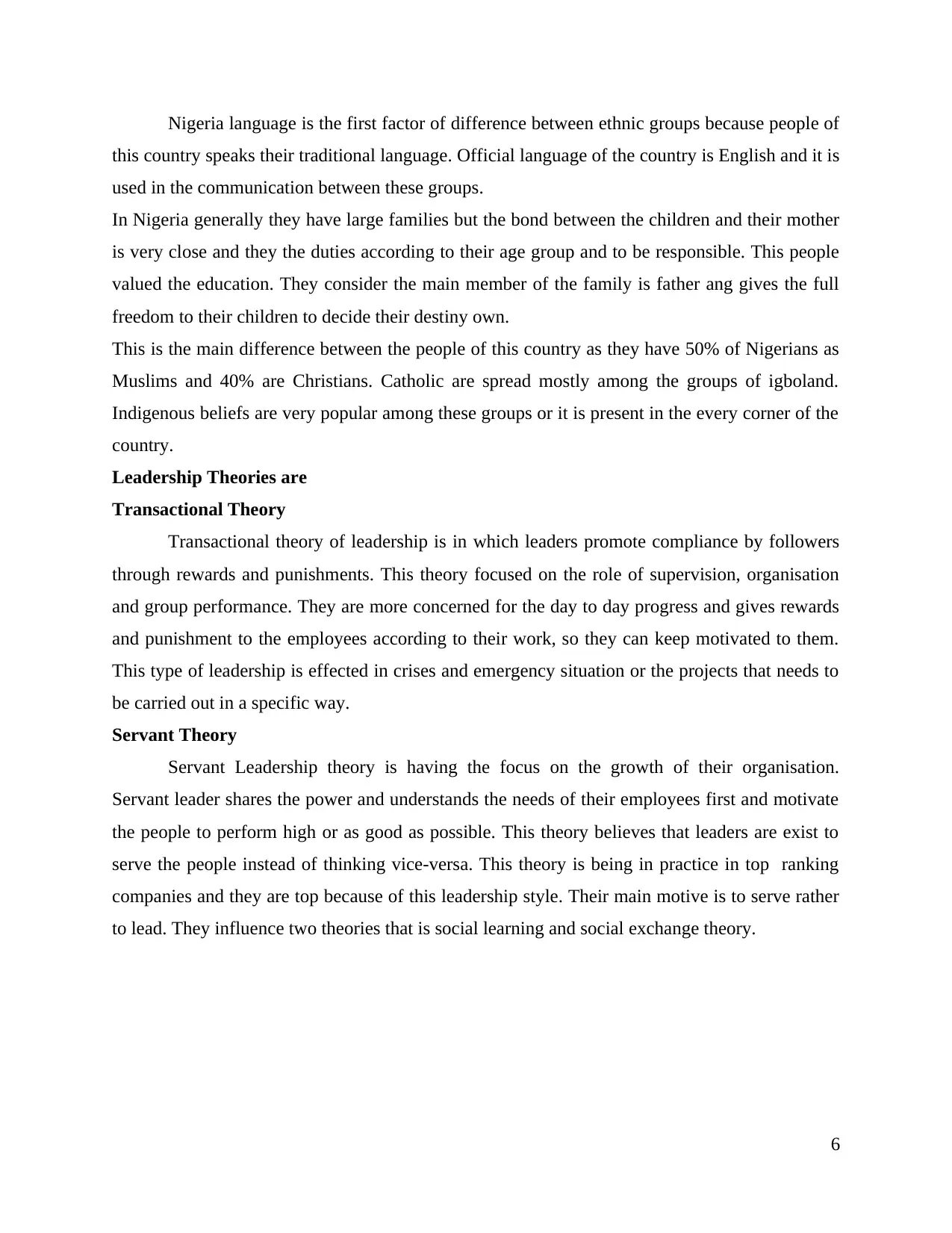
Nigeria language is the first factor of difference between ethnic groups because people of
this country speaks their traditional language. Official language of the country is English and it is
used in the communication between these groups.
In Nigeria generally they have large families but the bond between the children and their mother
is very close and they the duties according to their age group and to be responsible. This people
valued the education. They consider the main member of the family is father ang gives the full
freedom to their children to decide their destiny own.
This is the main difference between the people of this country as they have 50% of Nigerians as
Muslims and 40% are Christians. Catholic are spread mostly among the groups of igboland.
Indigenous beliefs are very popular among these groups or it is present in the every corner of the
country.
Leadership Theories are
Transactional Theory
Transactional theory of leadership is in which leaders promote compliance by followers
through rewards and punishments. This theory focused on the role of supervision, organisation
and group performance. They are more concerned for the day to day progress and gives rewards
and punishment to the employees according to their work, so they can keep motivated to them.
This type of leadership is effected in crises and emergency situation or the projects that needs to
be carried out in a specific way.
Servant Theory
Servant Leadership theory is having the focus on the growth of their organisation.
Servant leader shares the power and understands the needs of their employees first and motivate
the people to perform high or as good as possible. This theory believes that leaders are exist to
serve the people instead of thinking vice-versa. This theory is being in practice in top ranking
companies and they are top because of this leadership style. Their main motive is to serve rather
to lead. They influence two theories that is social learning and social exchange theory.
6
this country speaks their traditional language. Official language of the country is English and it is
used in the communication between these groups.
In Nigeria generally they have large families but the bond between the children and their mother
is very close and they the duties according to their age group and to be responsible. This people
valued the education. They consider the main member of the family is father ang gives the full
freedom to their children to decide their destiny own.
This is the main difference between the people of this country as they have 50% of Nigerians as
Muslims and 40% are Christians. Catholic are spread mostly among the groups of igboland.
Indigenous beliefs are very popular among these groups or it is present in the every corner of the
country.
Leadership Theories are
Transactional Theory
Transactional theory of leadership is in which leaders promote compliance by followers
through rewards and punishments. This theory focused on the role of supervision, organisation
and group performance. They are more concerned for the day to day progress and gives rewards
and punishment to the employees according to their work, so they can keep motivated to them.
This type of leadership is effected in crises and emergency situation or the projects that needs to
be carried out in a specific way.
Servant Theory
Servant Leadership theory is having the focus on the growth of their organisation.
Servant leader shares the power and understands the needs of their employees first and motivate
the people to perform high or as good as possible. This theory believes that leaders are exist to
serve the people instead of thinking vice-versa. This theory is being in practice in top ranking
companies and they are top because of this leadership style. Their main motive is to serve rather
to lead. They influence two theories that is social learning and social exchange theory.
6
⊘ This is a preview!⊘
Do you want full access?
Subscribe today to unlock all pages.

Trusted by 1+ million students worldwide
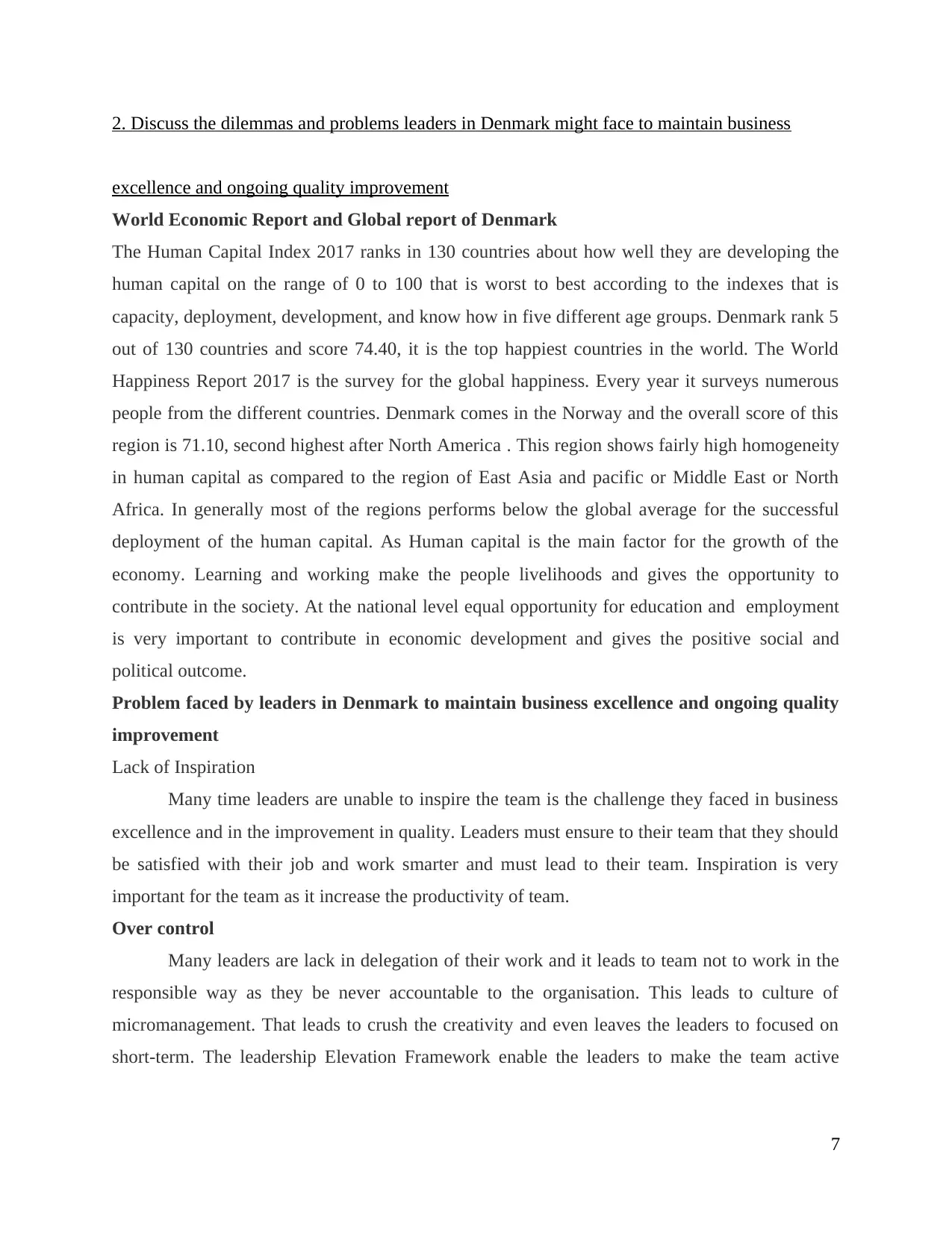
2. Discuss the dilemmas and problems leaders in Denmark might face to maintain business
excellence and ongoing quality improvement
World Economic Report and Global report of Denmark
The Human Capital Index 2017 ranks in 130 countries about how well they are developing the
human capital on the range of 0 to 100 that is worst to best according to the indexes that is
capacity, deployment, development, and know how in five different age groups. Denmark rank 5
out of 130 countries and score 74.40, it is the top happiest countries in the world. The World
Happiness Report 2017 is the survey for the global happiness. Every year it surveys numerous
people from the different countries. Denmark comes in the Norway and the overall score of this
region is 71.10, second highest after North America . This region shows fairly high homogeneity
in human capital as compared to the region of East Asia and pacific or Middle East or North
Africa. In generally most of the regions performs below the global average for the successful
deployment of the human capital. As Human capital is the main factor for the growth of the
economy. Learning and working make the people livelihoods and gives the opportunity to
contribute in the society. At the national level equal opportunity for education and employment
is very important to contribute in economic development and gives the positive social and
political outcome.
Problem faced by leaders in Denmark to maintain business excellence and ongoing quality
improvement
Lack of Inspiration
Many time leaders are unable to inspire the team is the challenge they faced in business
excellence and in the improvement in quality. Leaders must ensure to their team that they should
be satisfied with their job and work smarter and must lead to their team. Inspiration is very
important for the team as it increase the productivity of team.
Over control
Many leaders are lack in delegation of their work and it leads to team not to work in the
responsible way as they be never accountable to the organisation. This leads to culture of
micromanagement. That leads to crush the creativity and even leaves the leaders to focused on
short-term. The leadership Elevation Framework enable the leaders to make the team active
7
excellence and ongoing quality improvement
World Economic Report and Global report of Denmark
The Human Capital Index 2017 ranks in 130 countries about how well they are developing the
human capital on the range of 0 to 100 that is worst to best according to the indexes that is
capacity, deployment, development, and know how in five different age groups. Denmark rank 5
out of 130 countries and score 74.40, it is the top happiest countries in the world. The World
Happiness Report 2017 is the survey for the global happiness. Every year it surveys numerous
people from the different countries. Denmark comes in the Norway and the overall score of this
region is 71.10, second highest after North America . This region shows fairly high homogeneity
in human capital as compared to the region of East Asia and pacific or Middle East or North
Africa. In generally most of the regions performs below the global average for the successful
deployment of the human capital. As Human capital is the main factor for the growth of the
economy. Learning and working make the people livelihoods and gives the opportunity to
contribute in the society. At the national level equal opportunity for education and employment
is very important to contribute in economic development and gives the positive social and
political outcome.
Problem faced by leaders in Denmark to maintain business excellence and ongoing quality
improvement
Lack of Inspiration
Many time leaders are unable to inspire the team is the challenge they faced in business
excellence and in the improvement in quality. Leaders must ensure to their team that they should
be satisfied with their job and work smarter and must lead to their team. Inspiration is very
important for the team as it increase the productivity of team.
Over control
Many leaders are lack in delegation of their work and it leads to team not to work in the
responsible way as they be never accountable to the organisation. This leads to culture of
micromanagement. That leads to crush the creativity and even leaves the leaders to focused on
short-term. The leadership Elevation Framework enable the leaders to make the team active
7
Paraphrase This Document
Need a fresh take? Get an instant paraphrase of this document with our AI Paraphraser
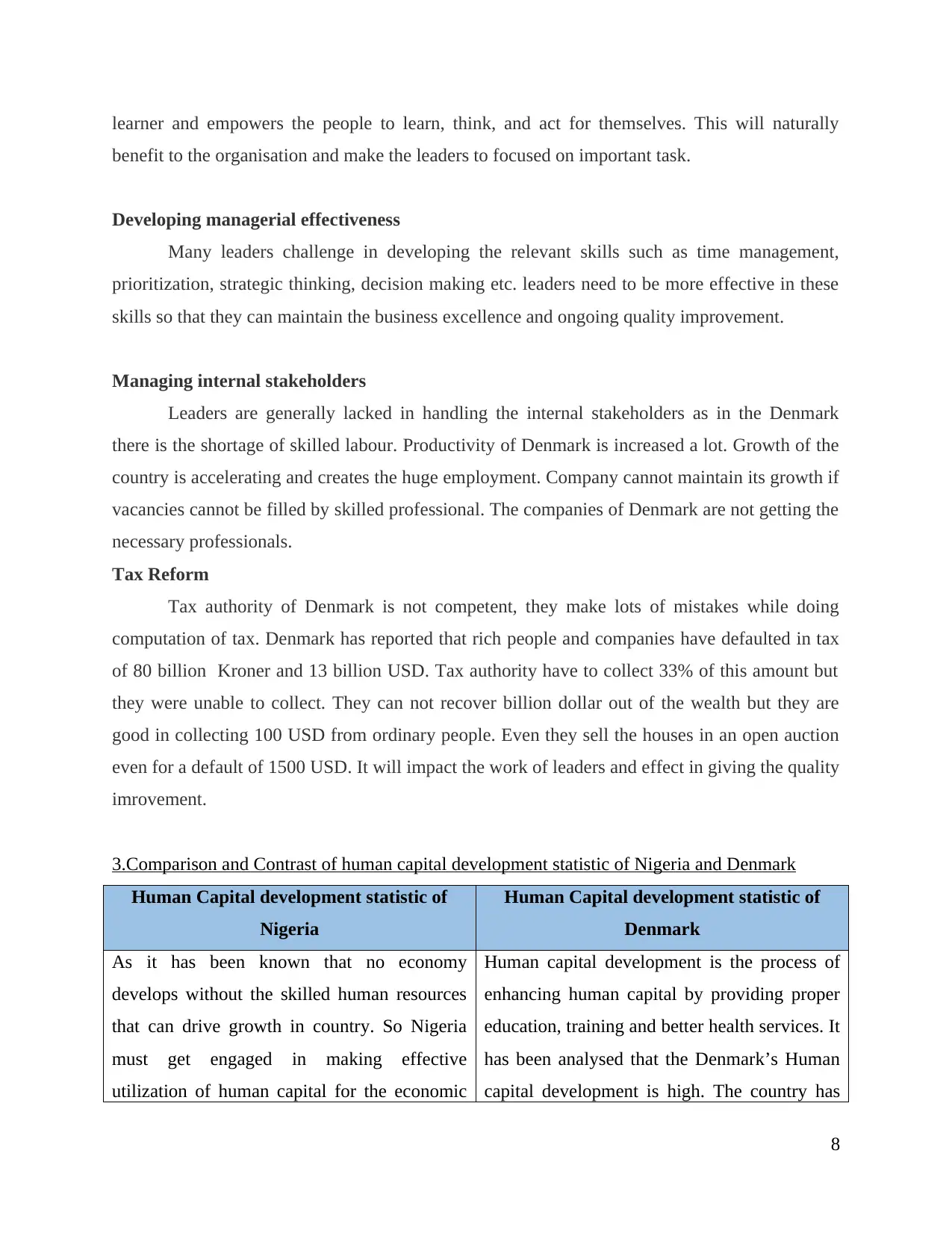
learner and empowers the people to learn, think, and act for themselves. This will naturally
benefit to the organisation and make the leaders to focused on important task.
Developing managerial effectiveness
Many leaders challenge in developing the relevant skills such as time management,
prioritization, strategic thinking, decision making etc. leaders need to be more effective in these
skills so that they can maintain the business excellence and ongoing quality improvement.
Managing internal stakeholders
Leaders are generally lacked in handling the internal stakeholders as in the Denmark
there is the shortage of skilled labour. Productivity of Denmark is increased a lot. Growth of the
country is accelerating and creates the huge employment. Company cannot maintain its growth if
vacancies cannot be filled by skilled professional. The companies of Denmark are not getting the
necessary professionals.
Tax Reform
Tax authority of Denmark is not competent, they make lots of mistakes while doing
computation of tax. Denmark has reported that rich people and companies have defaulted in tax
of 80 billion Kroner and 13 billion USD. Tax authority have to collect 33% of this amount but
they were unable to collect. They can not recover billion dollar out of the wealth but they are
good in collecting 100 USD from ordinary people. Even they sell the houses in an open auction
even for a default of 1500 USD. It will impact the work of leaders and effect in giving the quality
imrovement.
3.Comparison and Contrast of human capital development statistic of Nigeria and Denmark
Human Capital development statistic of
Nigeria
Human Capital development statistic of
Denmark
As it has been known that no economy
develops without the skilled human resources
that can drive growth in country. So Nigeria
must get engaged in making effective
utilization of human capital for the economic
Human capital development is the process of
enhancing human capital by providing proper
education, training and better health services. It
has been analysed that the Denmark’s Human
capital development is high. The country has
8
benefit to the organisation and make the leaders to focused on important task.
Developing managerial effectiveness
Many leaders challenge in developing the relevant skills such as time management,
prioritization, strategic thinking, decision making etc. leaders need to be more effective in these
skills so that they can maintain the business excellence and ongoing quality improvement.
Managing internal stakeholders
Leaders are generally lacked in handling the internal stakeholders as in the Denmark
there is the shortage of skilled labour. Productivity of Denmark is increased a lot. Growth of the
country is accelerating and creates the huge employment. Company cannot maintain its growth if
vacancies cannot be filled by skilled professional. The companies of Denmark are not getting the
necessary professionals.
Tax Reform
Tax authority of Denmark is not competent, they make lots of mistakes while doing
computation of tax. Denmark has reported that rich people and companies have defaulted in tax
of 80 billion Kroner and 13 billion USD. Tax authority have to collect 33% of this amount but
they were unable to collect. They can not recover billion dollar out of the wealth but they are
good in collecting 100 USD from ordinary people. Even they sell the houses in an open auction
even for a default of 1500 USD. It will impact the work of leaders and effect in giving the quality
imrovement.
3.Comparison and Contrast of human capital development statistic of Nigeria and Denmark
Human Capital development statistic of
Nigeria
Human Capital development statistic of
Denmark
As it has been known that no economy
develops without the skilled human resources
that can drive growth in country. So Nigeria
must get engaged in making effective
utilization of human capital for the economic
Human capital development is the process of
enhancing human capital by providing proper
education, training and better health services. It
has been analysed that the Denmark’s Human
capital development is high. The country has
8
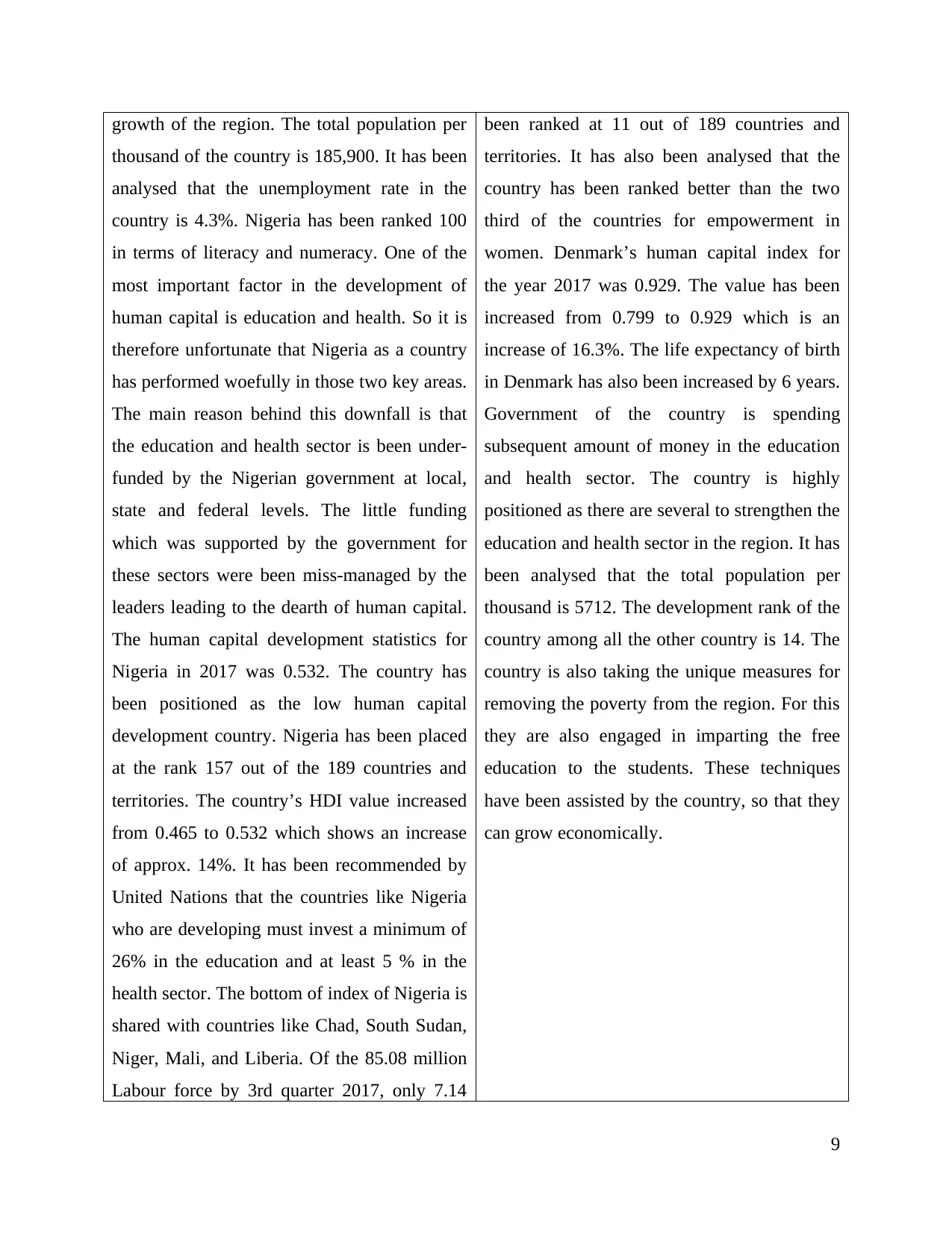
growth of the region. The total population per
thousand of the country is 185,900. It has been
analysed that the unemployment rate in the
country is 4.3%. Nigeria has been ranked 100
in terms of literacy and numeracy. One of the
most important factor in the development of
human capital is education and health. So it is
therefore unfortunate that Nigeria as a country
has performed woefully in those two key areas.
The main reason behind this downfall is that
the education and health sector is been under-
funded by the Nigerian government at local,
state and federal levels. The little funding
which was supported by the government for
these sectors were been miss-managed by the
leaders leading to the dearth of human capital.
The human capital development statistics for
Nigeria in 2017 was 0.532. The country has
been positioned as the low human capital
development country. Nigeria has been placed
at the rank 157 out of the 189 countries and
territories. The country’s HDI value increased
from 0.465 to 0.532 which shows an increase
of approx. 14%. It has been recommended by
United Nations that the countries like Nigeria
who are developing must invest a minimum of
26% in the education and at least 5 % in the
health sector. The bottom of index of Nigeria is
shared with countries like Chad, South Sudan,
Niger, Mali, and Liberia. Of the 85.08 million
Labour force by 3rd quarter 2017, only 7.14
been ranked at 11 out of 189 countries and
territories. It has also been analysed that the
country has been ranked better than the two
third of the countries for empowerment in
women. Denmark’s human capital index for
the year 2017 was 0.929. The value has been
increased from 0.799 to 0.929 which is an
increase of 16.3%. The life expectancy of birth
in Denmark has also been increased by 6 years.
Government of the country is spending
subsequent amount of money in the education
and health sector. The country is highly
positioned as there are several to strengthen the
education and health sector in the region. It has
been analysed that the total population per
thousand is 5712. The development rank of the
country among all the other country is 14. The
country is also taking the unique measures for
removing the poverty from the region. For this
they are also engaged in imparting the free
education to the students. These techniques
have been assisted by the country, so that they
can grow economically.
9
thousand of the country is 185,900. It has been
analysed that the unemployment rate in the
country is 4.3%. Nigeria has been ranked 100
in terms of literacy and numeracy. One of the
most important factor in the development of
human capital is education and health. So it is
therefore unfortunate that Nigeria as a country
has performed woefully in those two key areas.
The main reason behind this downfall is that
the education and health sector is been under-
funded by the Nigerian government at local,
state and federal levels. The little funding
which was supported by the government for
these sectors were been miss-managed by the
leaders leading to the dearth of human capital.
The human capital development statistics for
Nigeria in 2017 was 0.532. The country has
been positioned as the low human capital
development country. Nigeria has been placed
at the rank 157 out of the 189 countries and
territories. The country’s HDI value increased
from 0.465 to 0.532 which shows an increase
of approx. 14%. It has been recommended by
United Nations that the countries like Nigeria
who are developing must invest a minimum of
26% in the education and at least 5 % in the
health sector. The bottom of index of Nigeria is
shared with countries like Chad, South Sudan,
Niger, Mali, and Liberia. Of the 85.08 million
Labour force by 3rd quarter 2017, only 7.14
been ranked at 11 out of 189 countries and
territories. It has also been analysed that the
country has been ranked better than the two
third of the countries for empowerment in
women. Denmark’s human capital index for
the year 2017 was 0.929. The value has been
increased from 0.799 to 0.929 which is an
increase of 16.3%. The life expectancy of birth
in Denmark has also been increased by 6 years.
Government of the country is spending
subsequent amount of money in the education
and health sector. The country is highly
positioned as there are several to strengthen the
education and health sector in the region. It has
been analysed that the total population per
thousand is 5712. The development rank of the
country among all the other country is 14. The
country is also taking the unique measures for
removing the poverty from the region. For this
they are also engaged in imparting the free
education to the students. These techniques
have been assisted by the country, so that they
can grow economically.
9
⊘ This is a preview!⊘
Do you want full access?
Subscribe today to unlock all pages.

Trusted by 1+ million students worldwide
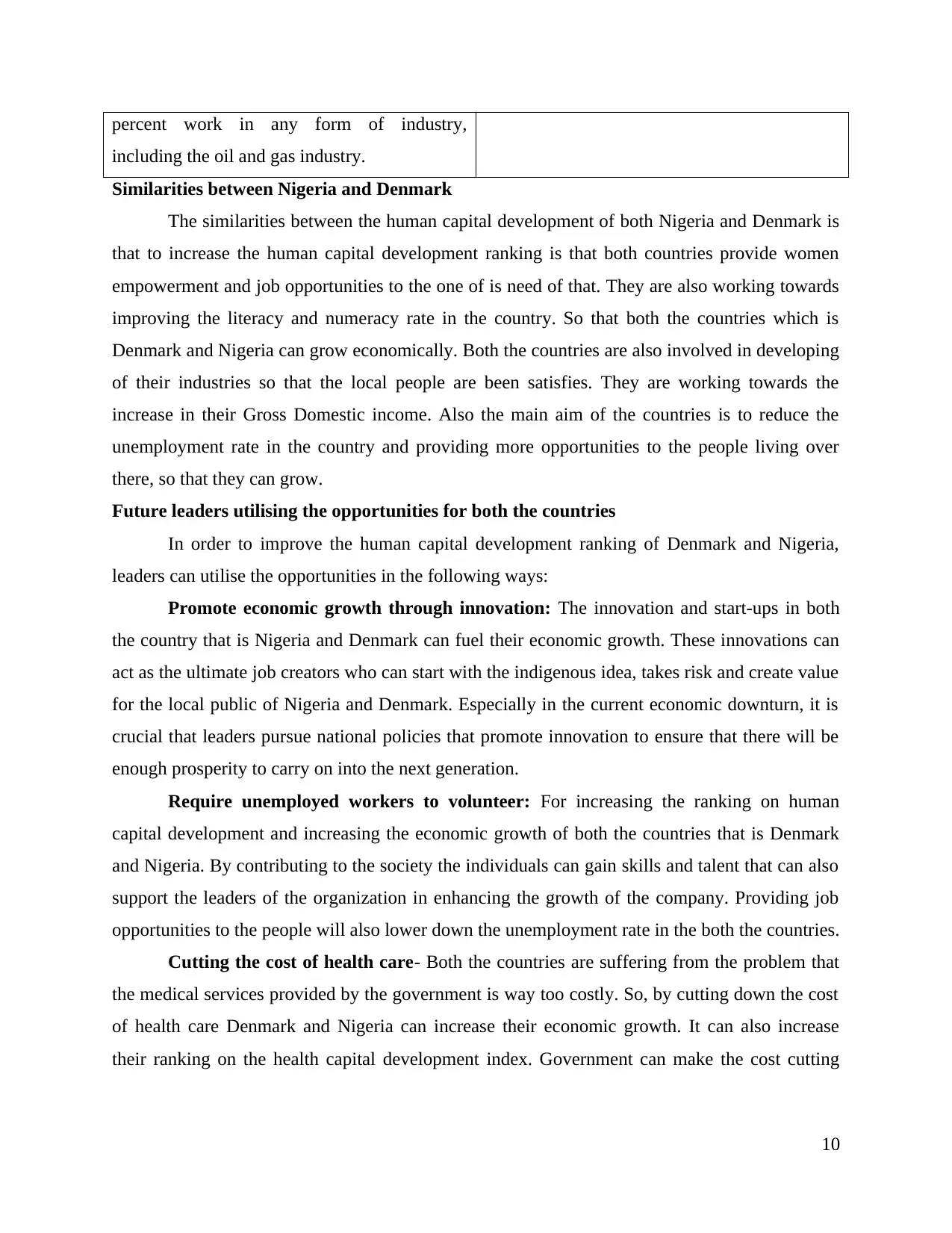
percent work in any form of industry,
including the oil and gas industry.
Similarities between Nigeria and Denmark
The similarities between the human capital development of both Nigeria and Denmark is
that to increase the human capital development ranking is that both countries provide women
empowerment and job opportunities to the one of is need of that. They are also working towards
improving the literacy and numeracy rate in the country. So that both the countries which is
Denmark and Nigeria can grow economically. Both the countries are also involved in developing
of their industries so that the local people are been satisfies. They are working towards the
increase in their Gross Domestic income. Also the main aim of the countries is to reduce the
unemployment rate in the country and providing more opportunities to the people living over
there, so that they can grow.
Future leaders utilising the opportunities for both the countries
In order to improve the human capital development ranking of Denmark and Nigeria,
leaders can utilise the opportunities in the following ways:
Promote economic growth through innovation: The innovation and start-ups in both
the country that is Nigeria and Denmark can fuel their economic growth. These innovations can
act as the ultimate job creators who can start with the indigenous idea, takes risk and create value
for the local public of Nigeria and Denmark. Especially in the current economic downturn, it is
crucial that leaders pursue national policies that promote innovation to ensure that there will be
enough prosperity to carry on into the next generation.
Require unemployed workers to volunteer: For increasing the ranking on human
capital development and increasing the economic growth of both the countries that is Denmark
and Nigeria. By contributing to the society the individuals can gain skills and talent that can also
support the leaders of the organization in enhancing the growth of the company. Providing job
opportunities to the people will also lower down the unemployment rate in the both the countries.
Cutting the cost of health care- Both the countries are suffering from the problem that
the medical services provided by the government is way too costly. So, by cutting down the cost
of health care Denmark and Nigeria can increase their economic growth. It can also increase
their ranking on the health capital development index. Government can make the cost cutting
10
including the oil and gas industry.
Similarities between Nigeria and Denmark
The similarities between the human capital development of both Nigeria and Denmark is
that to increase the human capital development ranking is that both countries provide women
empowerment and job opportunities to the one of is need of that. They are also working towards
improving the literacy and numeracy rate in the country. So that both the countries which is
Denmark and Nigeria can grow economically. Both the countries are also involved in developing
of their industries so that the local people are been satisfies. They are working towards the
increase in their Gross Domestic income. Also the main aim of the countries is to reduce the
unemployment rate in the country and providing more opportunities to the people living over
there, so that they can grow.
Future leaders utilising the opportunities for both the countries
In order to improve the human capital development ranking of Denmark and Nigeria,
leaders can utilise the opportunities in the following ways:
Promote economic growth through innovation: The innovation and start-ups in both
the country that is Nigeria and Denmark can fuel their economic growth. These innovations can
act as the ultimate job creators who can start with the indigenous idea, takes risk and create value
for the local public of Nigeria and Denmark. Especially in the current economic downturn, it is
crucial that leaders pursue national policies that promote innovation to ensure that there will be
enough prosperity to carry on into the next generation.
Require unemployed workers to volunteer: For increasing the ranking on human
capital development and increasing the economic growth of both the countries that is Denmark
and Nigeria. By contributing to the society the individuals can gain skills and talent that can also
support the leaders of the organization in enhancing the growth of the company. Providing job
opportunities to the people will also lower down the unemployment rate in the both the countries.
Cutting the cost of health care- Both the countries are suffering from the problem that
the medical services provided by the government is way too costly. So, by cutting down the cost
of health care Denmark and Nigeria can increase their economic growth. It can also increase
their ranking on the health capital development index. Government can make the cost cutting
10
Paraphrase This Document
Need a fresh take? Get an instant paraphrase of this document with our AI Paraphraser
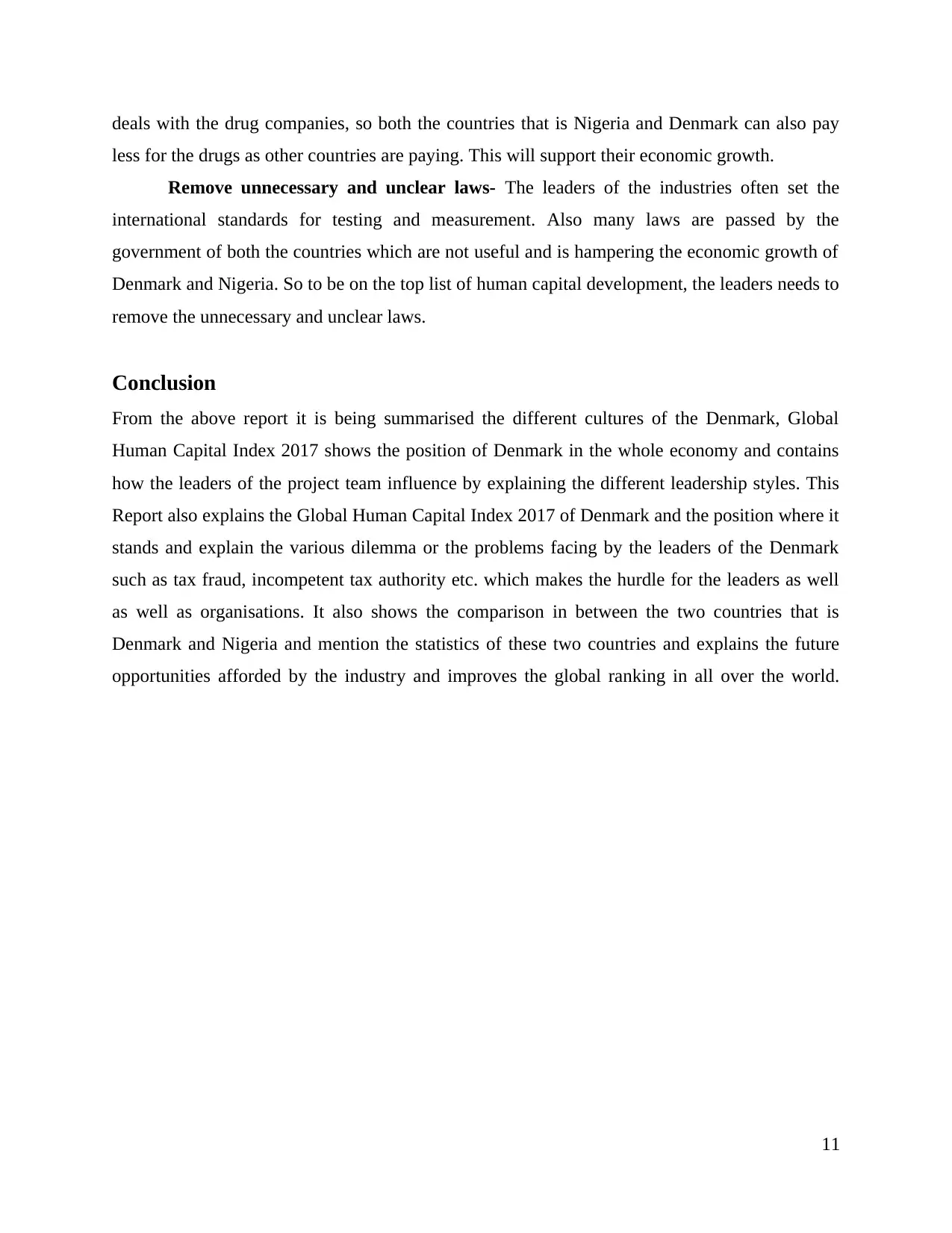
deals with the drug companies, so both the countries that is Nigeria and Denmark can also pay
less for the drugs as other countries are paying. This will support their economic growth.
Remove unnecessary and unclear laws- The leaders of the industries often set the
international standards for testing and measurement. Also many laws are passed by the
government of both the countries which are not useful and is hampering the economic growth of
Denmark and Nigeria. So to be on the top list of human capital development, the leaders needs to
remove the unnecessary and unclear laws.
Conclusion
From the above report it is being summarised the different cultures of the Denmark, Global
Human Capital Index 2017 shows the position of Denmark in the whole economy and contains
how the leaders of the project team influence by explaining the different leadership styles. This
Report also explains the Global Human Capital Index 2017 of Denmark and the position where it
stands and explain the various dilemma or the problems facing by the leaders of the Denmark
such as tax fraud, incompetent tax authority etc. which makes the hurdle for the leaders as well
as well as organisations. It also shows the comparison in between the two countries that is
Denmark and Nigeria and mention the statistics of these two countries and explains the future
opportunities afforded by the industry and improves the global ranking in all over the world.
11
less for the drugs as other countries are paying. This will support their economic growth.
Remove unnecessary and unclear laws- The leaders of the industries often set the
international standards for testing and measurement. Also many laws are passed by the
government of both the countries which are not useful and is hampering the economic growth of
Denmark and Nigeria. So to be on the top list of human capital development, the leaders needs to
remove the unnecessary and unclear laws.
Conclusion
From the above report it is being summarised the different cultures of the Denmark, Global
Human Capital Index 2017 shows the position of Denmark in the whole economy and contains
how the leaders of the project team influence by explaining the different leadership styles. This
Report also explains the Global Human Capital Index 2017 of Denmark and the position where it
stands and explain the various dilemma or the problems facing by the leaders of the Denmark
such as tax fraud, incompetent tax authority etc. which makes the hurdle for the leaders as well
as well as organisations. It also shows the comparison in between the two countries that is
Denmark and Nigeria and mention the statistics of these two countries and explains the future
opportunities afforded by the industry and improves the global ranking in all over the world.
11
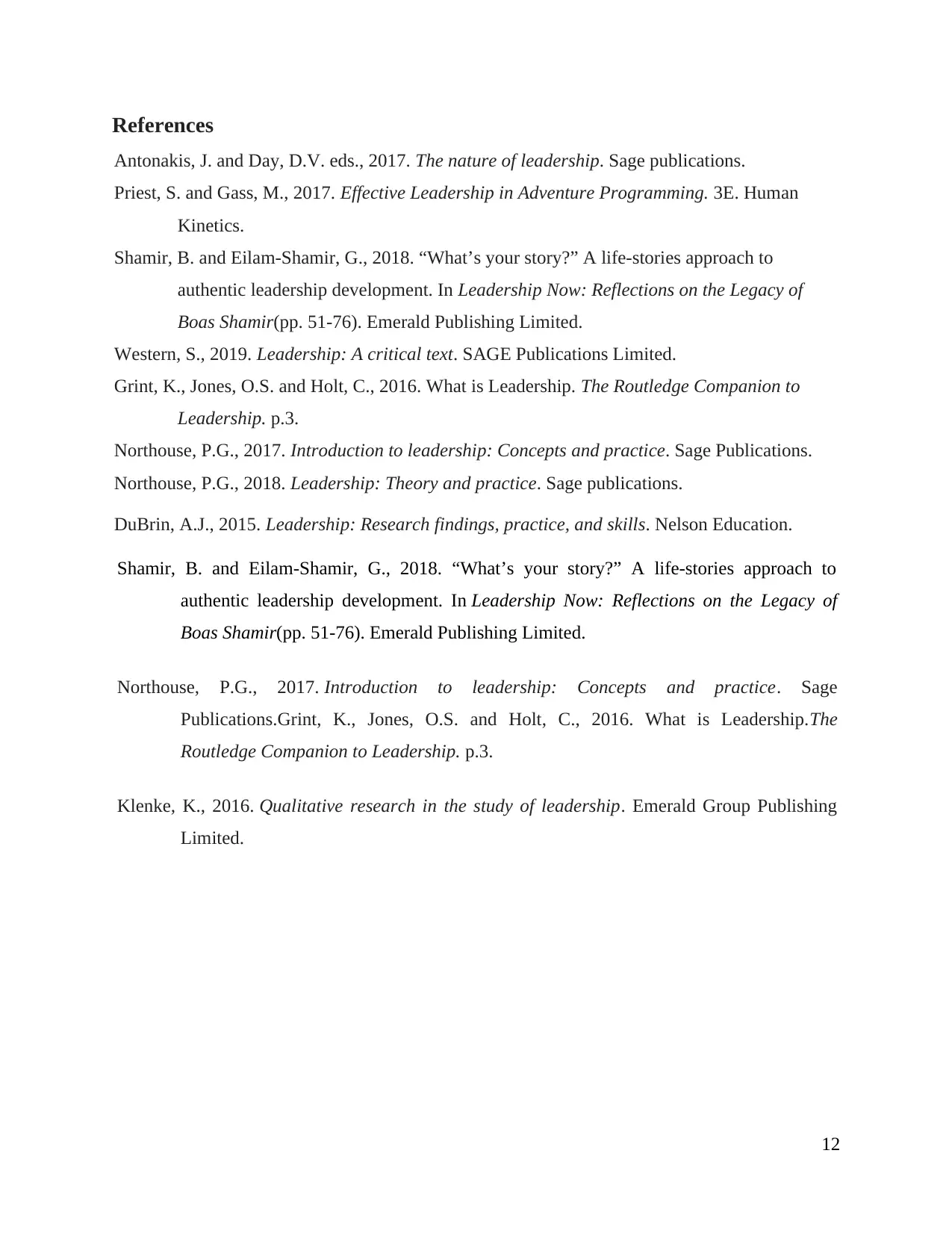
References
Antonakis, J. and Day, D.V. eds., 2017. The nature of leadership. Sage publications.
Priest, S. and Gass, M., 2017. Effective Leadership in Adventure Programming. 3E. Human
Kinetics.
Shamir, B. and Eilam-Shamir, G., 2018. “What’s your story?” A life-stories approach to
authentic leadership development. In Leadership Now: Reflections on the Legacy of
Boas Shamir(pp. 51-76). Emerald Publishing Limited.
Western, S., 2019. Leadership: A critical text. SAGE Publications Limited.
Grint, K., Jones, O.S. and Holt, C., 2016. What is Leadership. The Routledge Companion to
Leadership. p.3.
Northouse, P.G., 2017. Introduction to leadership: Concepts and practice. Sage Publications.
Northouse, P.G., 2018. Leadership: Theory and practice. Sage publications.
DuBrin, A.J., 2015. Leadership: Research findings, practice, and skills. Nelson Education.
Shamir, B. and Eilam-Shamir, G., 2018. “What’s your story?” A life-stories approach to
authentic leadership development. In Leadership Now: Reflections on the Legacy of
Boas Shamir(pp. 51-76). Emerald Publishing Limited.
Northouse, P.G., 2017. Introduction to leadership: Concepts and practice. Sage
Publications.Grint, K., Jones, O.S. and Holt, C., 2016. What is Leadership.The
Routledge Companion to Leadership. p.3.
Klenke, K., 2016. Qualitative research in the study of leadership. Emerald Group Publishing
Limited.
12
Antonakis, J. and Day, D.V. eds., 2017. The nature of leadership. Sage publications.
Priest, S. and Gass, M., 2017. Effective Leadership in Adventure Programming. 3E. Human
Kinetics.
Shamir, B. and Eilam-Shamir, G., 2018. “What’s your story?” A life-stories approach to
authentic leadership development. In Leadership Now: Reflections on the Legacy of
Boas Shamir(pp. 51-76). Emerald Publishing Limited.
Western, S., 2019. Leadership: A critical text. SAGE Publications Limited.
Grint, K., Jones, O.S. and Holt, C., 2016. What is Leadership. The Routledge Companion to
Leadership. p.3.
Northouse, P.G., 2017. Introduction to leadership: Concepts and practice. Sage Publications.
Northouse, P.G., 2018. Leadership: Theory and practice. Sage publications.
DuBrin, A.J., 2015. Leadership: Research findings, practice, and skills. Nelson Education.
Shamir, B. and Eilam-Shamir, G., 2018. “What’s your story?” A life-stories approach to
authentic leadership development. In Leadership Now: Reflections on the Legacy of
Boas Shamir(pp. 51-76). Emerald Publishing Limited.
Northouse, P.G., 2017. Introduction to leadership: Concepts and practice. Sage
Publications.Grint, K., Jones, O.S. and Holt, C., 2016. What is Leadership.The
Routledge Companion to Leadership. p.3.
Klenke, K., 2016. Qualitative research in the study of leadership. Emerald Group Publishing
Limited.
12
⊘ This is a preview!⊘
Do you want full access?
Subscribe today to unlock all pages.

Trusted by 1+ million students worldwide
1 out of 18
Related Documents
Your All-in-One AI-Powered Toolkit for Academic Success.
+13062052269
info@desklib.com
Available 24*7 on WhatsApp / Email
![[object Object]](/_next/static/media/star-bottom.7253800d.svg)
Unlock your academic potential
Copyright © 2020–2026 A2Z Services. All Rights Reserved. Developed and managed by ZUCOL.





